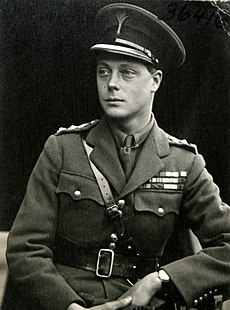Richard XIII of Estmere
| Richard XIII | |||||
|---|---|---|---|---|---|
 | |||||
| King of Estmere and of the Lands Beyond the Sea | |||||
| Reign | 16 June 1916 – 11 February 1934 | ||||
| Coronation | 11 June 1918 | ||||
| Predecessor | Edward IV | ||||
| Successor | Monarchy abolished (Wolfgar Godfredson as President of Estmere) | ||||
| Prime Minister | See list | ||||
| Born | William Richard Louis de Montcherié-Delacour 29 March 1900 Castle Montcherié, Kingdom of Estmere | ||||
| Died | 23 June 1984 (aged 84) Garrafrauns, Caldia | ||||
| Domestic partner | Liam Ó Cuanaigh | ||||
| |||||
| House | de Montcherié-Delacour Mountcherry | ||||
| Father | Edward IV | ||||
| Mother | Sophia of Werania | ||||
| Religion | Embrian Communion | ||||
Richard XIII (William Richard Louis; 29 March 1900 – 23 June 1984), known in his later life as William Mountcherry, was the last King of Estmere and the Lands Beyond the Sea from 16 June 1916 until his abdication and the wider abolition of the monarchy of Estmere on 11 February 1934, following the conclusion of the Great War.
Born as the first child of Edward IV and Sophia of Werania at the turn of the century, Richard's birth was subject to celebration. He spent only a year as the Duke of Tolbury, from 1915 to 1916. His father died at the outbreak of the Kireno-Estmerish War in June 1916, causing Richard to ascend to the throne. His mother acted as regent for the first year and a half of his reign. The start of his realm was tumultuous for the country, with the war defining the early years of his reign. His most symbolic leadership during the war was seen in a positive light for the most part, but his youth and inexperience became clear. After the war, he was officially crowned. This was less than a month after his 18th birthday.
After his coronation, Richard and his government focused on curtailling Gaullican influence in Euclea and beyond in an attempt to confront the percieved national functionalist threat. To achieve this, Richard interfered directly with the governance of the state, breaking with the Edwardian convention. He contoversially dismissed prime minister Basil Whittemore in 1924, inviting Leo Roseway to form a government in his stead and splitting the Socialist Party. After their victory in 1925, he increasingly relied on the support of the Unionist Party. He named their leader Victor Chadbourne prime minister, despite him not commanding the confidence of Parliament.
Chadbourne led the Estmerish government to embrace an anti-Gaullican foreign policy, and the Great War broke out on 2 February 1927 as a result. Richard was seen as a far less effective leader at the outbreak of the war than he had been previously, with his relations to the Gaullican monarchy causing a conflict of conscience in him. Richard fled alongside his government in 1928 as part of the government-in-exile, first in Longwood and later in occupied Caldia. Following the fall of Estmere, Richard became largely catatonic, and subsequently became a magnet for blame as to the poor showing of Estmere in the war. After the liberation of Estmere, Richard was advised by Laurence Montgomery in 1934 to abdicate in favour of a regency. Richard was apprehensive, but trusted the advice of Montgomery and did so, giving way to the Transitional Authority. The monarchy was officially abolished in the 1936 referendum after two years of regency.
Richard subsequently became a private citizen and moved to Caldia. It was revealed in 1961 that William was living with Liam Ó Cuanaigh in Garrafrauns, and his sexuality became a topic of discussion among the general public. He came out officially in 1969, and argued for the liberalisation of Estmerish laws on homosexuality. Robert Reynolds praised his intervention. William remained in Caldia until his death on 23 June 1984.